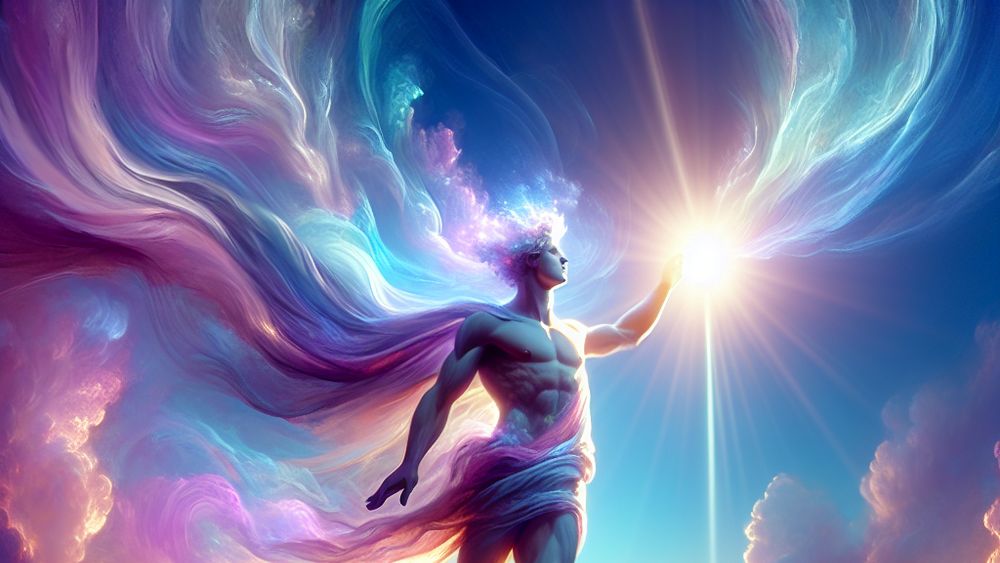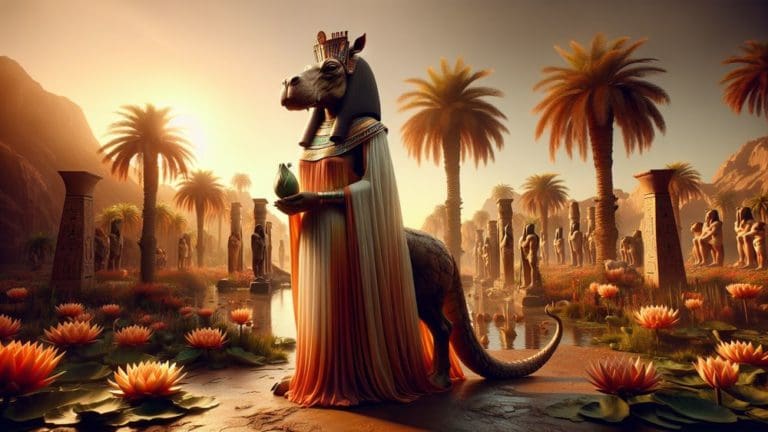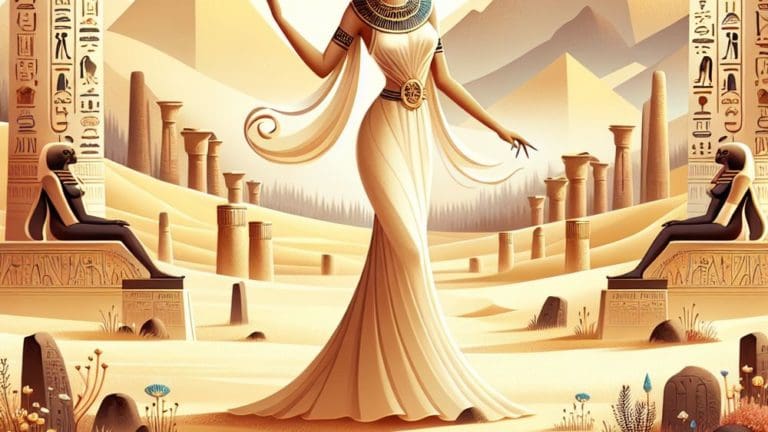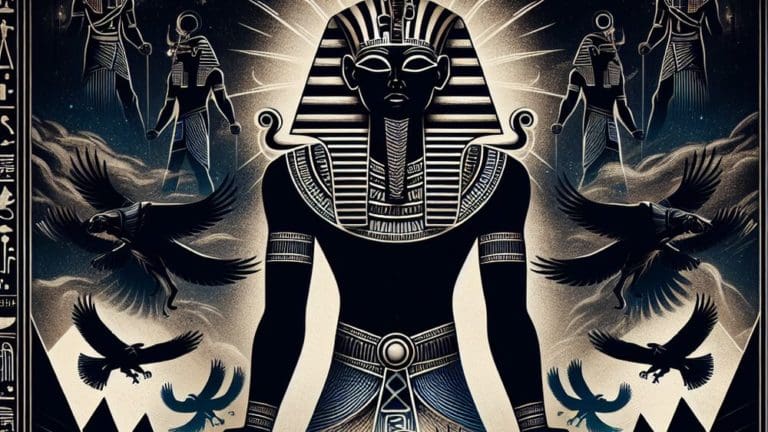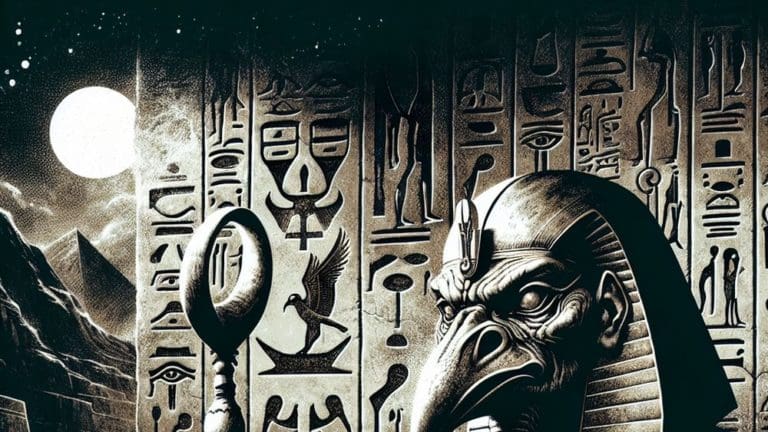Greek Mythology’s Aether: Primordial God Of Light and Sky
Greek Mythology’s Aether: Primordial God Of Light and Sky
Ever dived into the breathtaking world of Greek mythology? It’s like getting lost in a world where the impossible becomes possible, and every myth is a new adventure. Today, we’re zooming in on aether, the primordial god of light and sky, a figure that might not grab headlines like Zeus or Hercules but is absolutely key to the whole shebang.
Key Points:
- Aether is the primordial god of light and sky in Greek mythology.
- Aether emerged as the third generation of gods, separating sky from earth and light from darkness.
- Aether’s name means upper air or pure, fresh air in Ancient Greek.
- Aether is associated with purity, light, and the divine atmosphere in ancient texts.
- Aether’s role in Greek cosmogonies highlights his contribution to the order and harmony of the universe.
- Aether is depicted iconographically as the essence of light and the upper sky, rarely as a person in Greek art.
Imagine a time when the universe was just a chaotic soup with no order. Then enters aether, bringing light and clarity where there was none. Sounds cool, right? It sure is! And by going deep into aether’s story, we begin to understand the foundations of the Greek cosmos. It’s like piecing together a puzzle of the ancient world, and yes, it’s as awesome as it sounds.
The Origins of Aether in Greek Mythology
Now, let’s dive into how aether came to be. In the grand tapestry of Greek myths, aether isn’t just another god. He’s the embodiment of the bright, shining air that the gods breathe and the blue sky seen from Earth. Intriguing, isn’t it?
The Etymology of Aether
Curious about the name aether? It’s not just any name. It carries the weight of ancient knowledge. Aether, derived from Ancient Greek, means “upper air” or “pure, fresh air.” This name alone gives us a peek into how the ancients perceived the world around them.
- Aether: The bright, upper air
- Αἰθήρ (Aithēr): Ancient Greek for clear sky
- Root word: From the Greek verb αἴθω (aíthō), meaning “to ignite” or “to blaze”
The name aether symbolizes clarity and purity, originating from the Ancient Greek word for clear sky and igniting a sense of ancient wisdom and perception.
Aether’s Place in the Greek Cosmogony
Wondering where aether fits in the grand scale of creation? It’s all about the order of emergence in the cosmos. Let’s lay it out, simple and clear.
| Generation | Entities |
|---|---|
| 1st | Chaos, Gaia, Tartarus |
| 2nd | Erebus, Nyx |
| 3rd | Aether, Hemera |
Aether signifies the third generation, emerging from the primordial gods, marking the separation of sky from the earth and light from darkness.

The Genealogy of Aether: From Chaos to Light
The family tree of Greek gods is no simple affair, and aether’s origins are right there, tangled up in an epic saga of creation and divinity. Starting from the vast, formless expanse known as Chaos, the world begins to take shape.
From Chaos sprung Gaia (Earth), Tartarus (the Underworld), and Erebus (Darkness), followed by Nyx (Night). Nyx alone, in the embrace of the shadows, gives birth to aether, the very essence of light and daytime sky. Imagine this: from the pitch-black depths of Erebus and Nyx, comes aether, a beacon of light radiating through the early cosmos. It’s like the ultimate plot twist in the story of creation!
And it doesn’t stop there. Aether, in some tales, is said to be the father of Earth (Gaia) and Sky (Uranus) with his sister Hemera, personification of day. Together, they complete the cycle of day and night, illuminating the ancient Greek universe. It’s an epic family drama, only this time, it shapes the world as the ancients saw it.
Aether, the essence of light and daytime sky, emerges as a beacon of light from the depths of darkness in the epic Greek saga of creation, shaping the ancient universe.
The Significance of Aether in Ancient Texts
Aether isn’t just another name in the laundry list of Greek deities. He holds a spot in the framework of the universe itself, as reflected in ancient texts.
Aether in Hesiod’s Theogony
When Hesiod penned Theogony, he wasn’t just jotting down a family tree of the gods. He was mapping the cosmos, defining the boundaries of the earth and sky. Aether, in this grand narrative, is light itself – a primordial being born from darkness, lighting up the heavens and earth.
Hesiod describes Aether in poetic terms, as the clear, upper air that the gods breathe, as opposed to the dark mists of the earth inhabited by humans. This distinction isn’t just about physical space; it’s about divine separation, making Aether not just a god, but the very essence of the divine atmosphere. It’s like he’s saying, “Here’s the divine realm, lit up by Aether, and oh boy, it’s stunning!”
References to Aether in Orphic Texts
Orphic texts, a goldmine for enthusiasts of ancient Greek mythology, carry intriguing references to Aether. The Orphics depicted Aether as not just the upper sky but as a more refined air, one that the gods themselves breathed. This idea positions Aether as a divine substance, highlighting its significance beyond just being a part of the cosmos.
Within these texts, Aether is often hailed as the bright, glowing upper atmosphere that envelops the earth, symbolizing purity and light. It’s awesome how these ancient scripts emphasized Aether’s role, indicating his control over the light that defines day from night. The texts navigate through the belief that Aether, as a primordial deity, was fundamental in the creation and maintenance of life and the universe.

Aether’s Role in the Derveni and Hieronyman Theogonies
In the Derveni and Hieronyman Theogonies, which are among the lesser-known but equally fascinating Greek cosmogonies, Aether’s role is pivotal yet nuanced. These texts offer a unique perspective on the functioning of the early universe, with Aether cast as a key player in the orchestration of cosmic order. It’s like he was the universe’s conductor, ensuring everything was in harmony.
Aether here is not just the sky or light but a vital force, one that animates and energizes the cosmos. It’s detailed that Aether, in partnership with Earth (Gaia) and Sky (Uranus), contributed to the framework upon which ancient Greek cosmology was built. This deep dive into Aether’s contributions reinforces his integral role in the narrative of creation and the sustaining of life.
Aether’s role in the Derveni and Hieronyman Theogonies sheds light on his vital and dynamic contribution to the harmony and energization of the early universe.
The Iconography and Attributes of Aether
Aether’s iconography and attributes are truly captivating, reflecting his essence as the god of light and the upper sky. See, in ancient Greek art, Aether was seldom depicted as a person; he was more about the essence and the ethereal feel. Think of him not just as a deity, but as the very air you breathe, but way more awesome and with a divine twist.
General Attributes of Aether
When we talk about Aether’s general attributes, we’re getting into some seriously cool territory. Here’s the lowdown:
- Represents the upper air that the gods breathe
- Personification of the sky, especially the light of the upper air seen from the earth
- Associated with light and day, specifically the first light of day
- Seen as a medium where the gods exist, both separating and connecting the earth and the heavens
Aether was about more than just air; he was about that clear, unfathomable sky we gaze upon, wondering what lies beyond. This makes him not just a god to the ancient Greeks but a representation of wonder and the unknown.
Iconographic Representations of Aether
Iconographically, Aether is a tough one to pin down because he’s all about being ethereal and beyond visual representation. Unlike gods of thunder or the sea, Aether doesn’t get the easy depiction of holding a lightning bolt or a trident. Imagine him as the glow of dawn, the first beam of light that promises a new day. This glow, this essence, that’s Aether. In the rare instances he does appear in ancient Greek art, it’s usually as a luminous figure, often surrounded by clear, blue sky or interacting with other deities associated with the light.
Aether is symbolized as the essence of dawn, embodying the promise of a new day through luminous and ethereal depictions in ancient Greek art.
A Comprehensive List of Greek Mythology Gods
Now, if your appetite for the Greek pantheon has been whetted and you’re craving more, you’re in luck. Dive into an awesome list of all the Greek gods right here. Whether it’s the mighty Zeus, the crafty Hermes, or the vengeful Athena, there’s a god for every tale and a tale for every god.
FAQs
1. How is Aether related to the other primordial gods?
Aether’s relation to the other primordial gods is fascinating. Being the personification of the upper sky, light, and heavens, he’s literally the bright air the ancient Greeks thought enveloped the world. His parents, Erebus (darkness) and Nyx (night), basically represent the opposite vibes. So, Aether stands out as this glowing, positive force, setting the stage for the later gods of Olympus and positioning him as a sort of boundary between the divine and the mortal realms.
2. What are the main sources for our knowledge about Aether?
The main sources for our knowledge about Aether are ancient texts, notably by Greek poets like Hesiod and Homeric hymns. Hesiod’s Theogony gives us the spicy details on Aether’s genealogy, presenting him as a primordial deity. There’s also the Orphic tradition, where Aether is detailed in various Orphic hymns and theogonies. These sources are like the ancient Greek version of a blockbuster backstory for the cosmos, with Aether playing a key role.
3. In what ways did Aether influence ancient Greek culture?
Aether influenced ancient Greek culture by embodying the pristine air and light above the earth. This concept of Aether resounded with the Greeks, highlighting a cosmic order and purity that contrasted the chaotic beginnings from which the world emerged. His significance reflects in rituals and myths, where he was invoked for protection and as a symbol of the transcendent, further weaving him into the spiritual fabric of ancient Greek society.
4. Are there any modern interpretations or references to Aether?
Yes, there are modern interpretations and references to Aether. Though the scientific community has moved away from considering Aether as a physical substance for light propagation, the concept lives on in literature, video games, and movies. It’s used metaphorically to symbolize notions of purity, enlightenment, or even as a mystical element that powers the universe. It’s awesome how Aether has morphed from ancient cosmology to modern culture geekery.
Conclusion
Diving into the realm of Aether has been an adventure, uncovering how this primordial god of the upper sky and light meshes with the broader tapestry of Greek mythology. Aether’s story, from his genealogy to his significance in ancient texts and cultural influence, reminds us of humanity’s timeless fascination with the cosmos and the stories we conjure to explain it. Whether you’re a history buff, a mythology nerd, or just love a good story, Aether’s tale is a testament to the enduring legacy of these ancient narratives in shaping our understanding of the world.
So, we’ve journeyed through the clouds and back, exploring the light-filled domain of Aether that still illuminates our modern imagination. It’s been awesome, and I hope you’re as enthused about these ancient stories as I am. Catch you next time for more mythological deep dives. Until then, stay curious and keep the myth alive.
Cheers, Cedric

